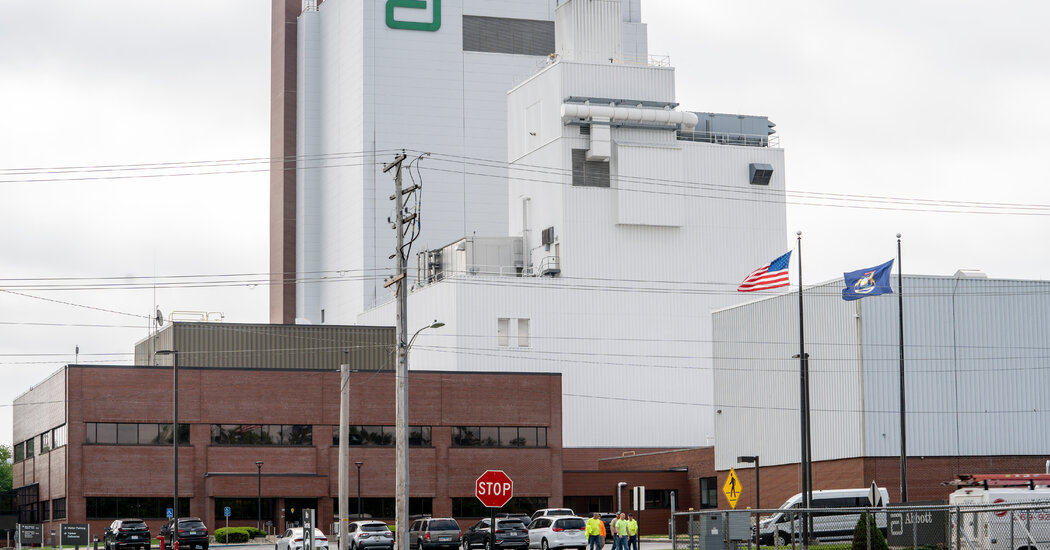Abbott Nutrition, the company that caused a national baby food shortage when it closed a leading production facility in February due to contamination concerns, said on Saturday that the site has restarted production of EleCare and other formulas.
The restart of the Sturgis, Michigan plant, which was the result of an agreement with the federal Food and Drug Administration, renewed hopes that the shortage of formulas that has left stressed parents scrambling would ease.
According to Datasembly, which tracks retail data, the number of sold-out products in stores across the country had risen to about 74 percent in the week ending May 28. The crisis, which had been going on for months and resulting from pandemic supply problems, was exacerbated by the closure of the plant.
In a statement, Abbott said EleCare would be released to consumers around June 20 and it was “working hard” to restart production of Similac and other formulas.
“We understand the urgent need for formulas and our top priority is to get high-quality, safe formulas into the hands of families across America,” the company said. “We will ramp up production as soon as possible while meeting all requirements.”
Read more about the shortage of baby food
In February, Abbott announced it was voluntarily recalling three infant formulas after four infants fed formula made at the Sturgis factory became ill with bacterial infections.
The FDA had received three consumer complaints about Cronobacter sakazakii, a bacterium that can cause serious, life-threatening infections or inflammation of the membranes that protect the brain and spine. Abbott has said there was no “conclusive evidence” to link the company’s formulas to the diseases.
dr. Food and Drug Administration commissioner Robert M. Califf told a House panel last month that the Sturgis plant had a leaky roof, water puddles on the floor and cracks in production equipment that allowed bacteria to enter and persist.
He provided detailed information about “extremely unsanitary” conditions, but he also acknowledged that his agency was too slow in addressing problems in the factory.
In a statement on Saturday, the FDA said it had researchers at the Sturgis plant for several days to observe improvements to the floor, roofing and equipment at the facility. Abbott reported that the facility tested negative for Cronobacter, the agency said.
A consent decree the company signed with the government provides a series of new safeguards, including hiring a qualified expert to oversee improvements at the plant and notifying the FDA if it finds any contaminants.
The agency said on Saturday that the steps it has taken, including the restart of the Sturgis factory, “will mean more and more infant formula is on its way to or already on store shelves.”
The plant’s shutdown exacerbated an existing supply crisis as parents rushed to stock up on formulas, sometimes driving for hours, while networks formed on social media to help them connect with dwindling supplies.
Navigating the US Baby Food Shortage
A growing problem. A nationwide baby food shortage – caused in part by supply chain problems and exacerbated by a recall from baby food manufacturer Abbott Nutrition – has left parents confused and concerned. Here are some ways to deal with this uncertainty:
With the shelves empty in some communities, some parents are so desperate that they have fed their babies oatmeal cereal and powdered fruit juice, although pediatricians recommend formula or breast milk as crucial sources of nutrition from birth to a baby’s first birthday.
In the short term, the White House-announced imports from Europe and elsewhere are expected to play a bigger role in reducing the deficit than the restart of the Sturgis factory, Steven A. Abrams, professor of pediatrics at Dell Medical School at the United States. University of Texas at Austin, said on Saturday.
The reopening of the Abbott factory will be a relief for parents of severely allergic babies, as EleCare is targeted at them, said Dr. Abrams.
“What most families find in the supermarket, importing the formulas that are going to take place from UK, Australian and Mexican sources will have a much bigger impact,” he said.

